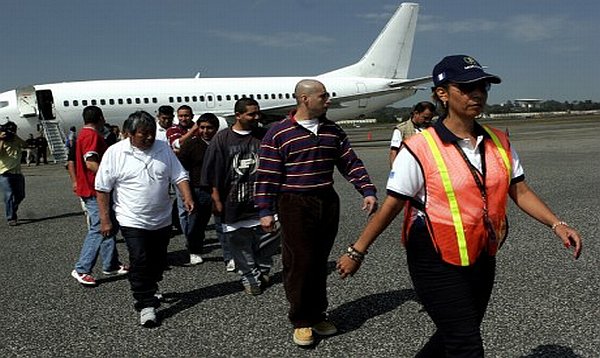Washington - On April 1, 2012, Mexico and the United States began testing a new deportation program for Mexicans caught without proper documents in the United States. Instead of dropping them at random points along the nearly 2,000-mile border, the US government will fly them back to Mexico, where the Mexican government will take over and bus them back to their hometowns.
Criminal activity along the border has raised concerns for both governments. Mayors and governors of Mexican border cities and states have complained about the influx of mass deportations to their regions. Mexicans dropped at the border depleted of money with no way to get home are easy targets for criminal gangs, who may prey on them or offer them work. Additionally, a small portion of deportees is kicked out for committing violent crimes in the United States, piling more criminals into the region.
The United States also hopes to make it less tempting for the deported to turn right around and try another entry, both for anti-immigration reasons and for the safety of the deportees, who often die during dangerous desert crossings.
There is no word yet as to the extent or the length of the pilot program, but Mexico’s Secretary of the Interior, Alejandro Poire, cited the current Voluntary Repatriation Program in Arizona as an example, where those who give themselves up to US authorities are flown to Mexico City and then bused home. That program has been in place since 2004.
This is the latest in a long string of immigration and deportation strategies backed by different groups with different motivations.
The Alien Transfer Exit Program currently flies illegal immigrants caught in Texas all the way to California before shipping them back across the border. The strategy was conceived as a way to break up support networks and discourage the crossers from simply trying again the next day.
Last November, Denver instituted a pilot program to put certain immigration cases on hold in the courts in order to make room for more pressing cases. If undocumented immigrants met certain low priority criteria (serving in the military, a long time living in the United States, graduating high school or college there, being elderly), their cases were closed. Meanwhile, criminal cases went straight to the top of the pile.
The Denver pilot program was intended as a balance to the Department of Homeland Security’s Secure Communities program, which compels local governments and the FBI to share criminal records with immigration officials. Critics have said the program casts its net too wide, arresting and deporting more people for minor infractions and misdemeanors than serious criminals. Secure Communities also provides no additional funding to local law enforcement, thus straining their resources. Several states have tried to opt out of the program.
Other reformers take things a step farther. The attrition through enforcement strategies (popularly known as self-deportation) started with Arizona’s controversial SB 1070. The idea is to require police and other officials to question anyone they suspect could be an illegal immigrant, making public life so difficult that illegal immigrants will decide to go back to their home countries.
Alabama currently has the harshest of these laws with its HB 56, passed in 2011. Drafted mostly by the same person who did Arizona’s, Kansas Secretary of State Kris Koboch, it requires local and state officials to verify citizenship for any “transaction with a citizen.” It also prohibits landlords from renting property to illegal immigrants.
Critics say the law has hurt Alabama, as illegal immigrants flee to other states and jobs in agriculture, construction, food service, and hospitality thin out and are not replaced by American workers. Furthermore, after the high-profile arrests of automobile industry executives from Mercedes-Benz and Honda during routine traffic stops, the state all of a sudden doesn’t look like a great place for foreign investment anymore.
Other groups favor pathways to citizenship for societal contributors. The DREAM Act and others like it would give young immigrants who attend college or serve in the military conditional temporary residency, leading to permanent residency after a few years.


